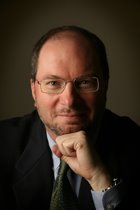A heavenly program from The Hilliard Ensemble
Yes...MORE great singing. Hilary Hahn's eagerly anticipated recital on Sunday is sold-out, and the waiting list for tickets continues to grow. But there's much more this weekend. The four male singers of The Hilliard Ensemble (which takes its name from the British miniaturist painter Nicholas Hilliard) are, simply put, extraordinary artists, and they're back with us tomorrow (Saturday, February 14th).
There's always much to learn and enjoy from The Hilliard Ensemble. Connoisseurs of vocal programming know that The Hilliards' programs are masterfully conceived. I'm most fond of the ones that juxtapose early and contemporary music, since the stylistic contrasts among the works, as experienced in performance, tend to heighten the expressiveness of the music synergistically, which in turn heightens my sense of discovery.
Thus when I saw their program Arkhangelos, which combines early chant and sacred music from several centuries of Christian tradition with works by excellent living composers such as James Macmillan, Arvo Paert, Ivan Moody and Jonathan Wild, I was intrigued. The highly informative program notes provided by The Hilliards are another valuable dimension their performances. These are intrepid music historians and researchers who enrich the repertoire by commissioning new works, consistently finding miraculous ways of interweaving the old with the new. There is a deeply satisfying meaning to their music-making that is altogether too rare.
So...we are promised a mystical musical journey with The Hilliards as our expert guides. Beyond appreciating the religious significance of the works and their texts, I also look forward to sitting back and basking in the glorious and gratifying sound they make (a hedonistc response to a sacred program that cannot be denied).
In retrospect, I suppose I could have requested an earthier or more romantic program for Valentine's Day -- but this is love of a transcendent sort....sustenance for the soul. Let love and chocolate abound, however. We'll have complimentary chocolates for everyone. Endorphins can boost the appreciation of music, surely one of life's greatest pleasures. (My colleagues at Spivey Hall are very familiar with one of my favorite mottos: "A little bit of chocolate goes a long way, and more goes farther.")
And of course, the acoustics of Spivey Hall provide an ideal showcase for the music they make. The Hilliard Ensemble deserves all the critical praise accorded them for their far-flung concert tours and first-rate recordings. If you're remotely inclined to come, don't hesitate, join us -- you will be glad you did.
There's always much to learn and enjoy from The Hilliard Ensemble. Connoisseurs of vocal programming know that The Hilliards' programs are masterfully conceived. I'm most fond of the ones that juxtapose early and contemporary music, since the stylistic contrasts among the works, as experienced in performance, tend to heighten the expressiveness of the music synergistically, which in turn heightens my sense of discovery.
Thus when I saw their program Arkhangelos, which combines early chant and sacred music from several centuries of Christian tradition with works by excellent living composers such as James Macmillan, Arvo Paert, Ivan Moody and Jonathan Wild, I was intrigued. The highly informative program notes provided by The Hilliards are another valuable dimension their performances. These are intrepid music historians and researchers who enrich the repertoire by commissioning new works, consistently finding miraculous ways of interweaving the old with the new. There is a deeply satisfying meaning to their music-making that is altogether too rare.
So...we are promised a mystical musical journey with The Hilliards as our expert guides. Beyond appreciating the religious significance of the works and their texts, I also look forward to sitting back and basking in the glorious and gratifying sound they make (a hedonistc response to a sacred program that cannot be denied).
In retrospect, I suppose I could have requested an earthier or more romantic program for Valentine's Day -- but this is love of a transcendent sort....sustenance for the soul. Let love and chocolate abound, however. We'll have complimentary chocolates for everyone. Endorphins can boost the appreciation of music, surely one of life's greatest pleasures. (My colleagues at Spivey Hall are very familiar with one of my favorite mottos: "A little bit of chocolate goes a long way, and more goes farther.")
And of course, the acoustics of Spivey Hall provide an ideal showcase for the music they make. The Hilliard Ensemble deserves all the critical praise accorded them for their far-flung concert tours and first-rate recordings. If you're remotely inclined to come, don't hesitate, join us -- you will be glad you did.

